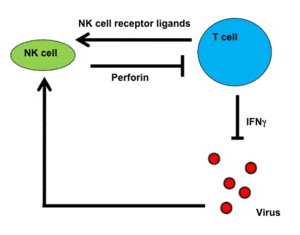Immunology

Many cell populations of the immune system are required to initiate a productive immune response. Anti-viral T cells are primed by antigen presenting cells for example dendritic cells. However, the viral antigen has to be amplified during viral infection in order to activate protective T cell immunity. This amplification of virus can be performed by CD169+macrophages in the marginal zone of the spleen. These macrophages are essential for adaptive immune priming and for prevention of fatal disease.
After anti-viral T cells have been activated and expanded, they can recognise and eliminate virus infected cells. However, there are regulatory mechanisms which inhibit the T cell immunity to prevent auto reactive immune responses and excessive tissue damage. During viral infection, natural killer cells (NK cells) can specifically inhibit anti-viral T cells. This limited anti-viral T cell immunity results into chronic viral infection and disease. Moreover, these mechanisms are essential for the immune systems answer against cancer. The Department of Molecular Medicine II therefore identifies factors which can influence and regulate immunity.



